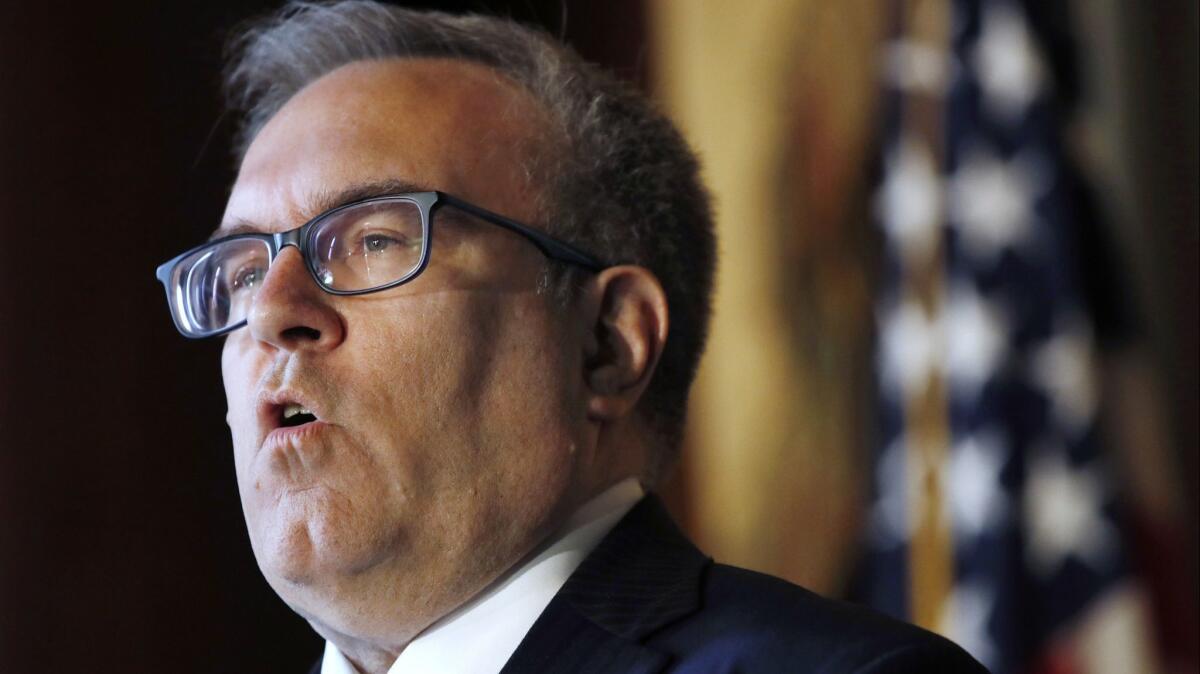EPA reverses course, says it will enforce stricter pollution limits for ‘glider’ trucks

- Share via
Reporting from Washington — The Environmental Protection Agency reversed course late Thursday and announced it would enforce stricter pollution controls on freight trucks known as gliders, which emit dozens of times more soot and contaminants compared with those that have new diesel engines.
In a three-page memo to his deputies, acting Administrator Andrew Wheeler said he would withdraw the “no action assurance” the agency had given the manufacturers of glider trucks on the last day that his predecessor, Scott Pruitt, headed the EPA. That letter assured firms that they would not have to limit their annual production to 300 vehicles through the end of 2019.
The EPA initially proposed a rule last November to repeal tighter emissions standards for glider trucks, which had been set to take effect in January. The Obama-era regulation aimed at controlling soot and other pollutants and greenhouse gas emissions linked to climate change had the support of both public health advocates and some major trucking groups and engine manufacturers.
But it faced fervent opposition from a handful of companies that manufacture truck gliders. The glider, or body, is the front part of a truck, including the cab, that fits over the engine. Leading the charge against the new regulation was Fitzgerald Truck Sales, the Tennessee-based manufacturer that stood to benefit most from the rule’s repeal. Fitzgerald, whose executives had met with Pruitt last May, had argued that the rule would disproportionately affect an industry that in 2015 produced roughly 10,000 gliders a year.
Environmental groups challenged the EPA’s “no action assurance” letter on July 17 in the U.S. Court of Appeals for the District of Columbia Circuit, asking for an administrative stay as the court considered their emergency motion. A day later, the court granted the stay.
In his memo, Wheeler noted that the agency suspends enforcement only in rare circumstances, and that after consulting with EPA lawyers and policy experts, “I have concluded that the application of the current regulations to the glider industry does not represent the kind of extremely unusual circumstances that support the EPA’s use of enforcement discretion.”
Legal experts said that the risk of losing in court played a key role in Wheeler’s decision.
“This had all the hallmarks of a major loss,” Justin Savage, a partner at Sidley Austin specializing in environmental law, said in an interview Thursday. “This was so broadly cast [that it] would have potentially circumscribed the agency’s ability to issues these kinds of letters in the future.”
Political considerations also influenced the move: Sen. Tom Carper of Delaware, the top Democrat on the Senate Environment and Public Works Committee, had personally appealed to Wheeler in a letter just after he took over the agency to “abandon legally questionable policies and proposals” such as the one on gliders.
Carper, who also brought up the issue in a conversation with Wheeler this month, said in a statement Thursday that he was “glad to see EPA will reverse one of the most egregious — and likely illegal — environmental proposals of [Pruitt’s] tenure.”
“His senseless proposal ignored the science put out by his own EPA and created a Clean Air Act loophole for an industry friend, all while putting the health of Americans and our environment at risk,” Carper added.
Fred Krupp, president of the Environmental Defense Fund, an advocacy group, called Wheeler’s decision “a huge win for all Americans who care about clean air and human health.”
“EPA’s effort to create a loophole allowing more [gliders] onto our roads was irresponsible and dangerous,” Krupp said in a statement late Thursday. “We hope their decision tonight to withdraw that loophole puts a firm and final end to this serious threat to our families’ health.”
In proposing to repeal the Obama-era regulation, Pruitt and his deputies had relied in part on findings out of Tennessee Tech University that concluded gliders “performed equally as well and in some instances outperformed” vehicles with newer engines. The school said one of its engineering professors had gone with graduate students “to a Fitzgerald facility to conduct independent research” on the EPA rule.
Even though the EPA’s own modeling found that gliders emit from 20 to 40 times as much nitrogen oxides and soot as trucks with new engines, the EPA quickly decided that Fitzgerald’s arguments questioning the rule had merit. The president of Tennessee Tech later disavowed the study, saying that experts now question “the methodology and accuracy” of the industry-funded test.
Fitzgerald could not be immediately reached for comment Thursday night.
While Wheeler has now reversed the move to suspend enforcement of stricter emissions limits through 2019, it remains unclear whether the agency will abandon its effort to repeal the Obama-era standards altogether.
Carper noted that the proposed rule is still “on the table. I’ll keep pushing to see that this misguided proposal is one that never gets finalized.”
More to Read
Sign up for Essential California
The most important California stories and recommendations in your inbox every morning.
You may occasionally receive promotional content from the Los Angeles Times.










